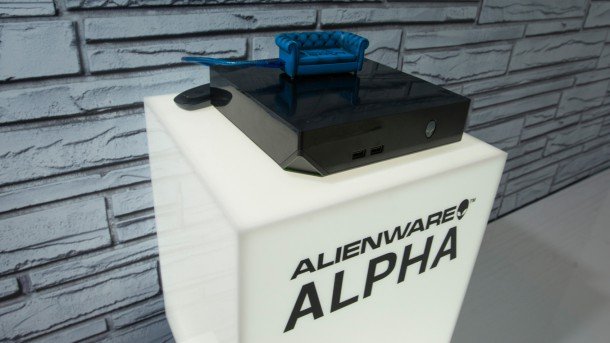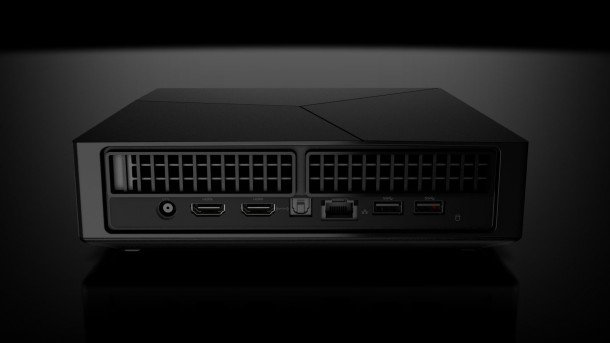Alienware Alpha: impressions of the $550 Windows 8.1 Steam Machine

I met with Alienware at E3 2014 to look at the only prominent PC at the show: the Alienware Alpha , a miniature Steam Machine going on sale around the end of the year. This Steam Machine won't be running Valve's Linux-based SteamOS , or ship with a Steam Controller, though—when Valve delayed final releases of both to next year, Alienware decided to switch to Windows 8.1 with a custom UI and boot sequence that launches straight into Steam Big Picture. What I saw was an early, rough version of that UI, but Alienware made it clear that you shouldn't ever have to see Windows when you boot up the box. Unless, of course, you want to.
The UI I saw for the Alpha was about as simple as it could get: a black screen with the Steam Logo, with large, sans-serif type underneath for menu options: launching Steam and messing with settings. The settings menu will let you exit out to the Windows desktop, if you want, but otherwise you'll never see the Windows 8 Metro interface. You'll just launch straight into Steam Big Picture. Everything will be controllable with a wireless Xbox 360 controller, included with the console.
The Alienware Alpha measures a compact 7x7x2 inches. It's noticeably more compact than either the PlayStation 4 or the Xbox One, and potentially more powerful—it's hard to directly compare the Alpha's 4GB of DDR3 memory, i3 processor and custom Nvidia Maxwell GPU (with 2GB GDDR5) to, say, the PlayStation 4's 8GB of unified GDDR5 and custom AMD CPU. The Alpha will have to deal with Windows overhead that the consoles don't have. Still, Alienware says its goal is to run today's biggest games and the demanding games coming out post-launch at a reliable 1080p, 60fps.
To that end, I'm surprised by how open Alienware is being with the system. Everything, with the exception of the customized Nvidia GPU, will be user-replaceable or upgradeable. I asked Alienware if it would be cheaper to buy those parts separately as an end-user or to upgrade through them, and they said frankly they didn't know, this far out from launch. But if you want to buy your own RAM or SSD or a new CPU, you'll be able to lift off the entire top of the system and replace its parts.

The same goes for fiddling with Windows settings. This is a PC, if you want it to be. For Alienware, first and foremost, it's a Steam gaming console for the living room that happens to run on Windows. The rest of the year leading up to a holiday release will go towards polishing the custom UI for easy Windows settings (think choosing your Internet input, handling the HDMI input/output, etc.) and launching Steam Big Picture. Alienware didn't want to wait for Valve to finish SteamOS, but they told me they're completely committed to the platform. As soon as Valve does a full launch for the OS and the Steam controller, a Linux Alpha will be there.
The most surprising part of my demo of the Alpha was when Alienware asked me what I thought most PC gamers wanted. Would they be happy with a PC box that shipped with a controller, even if it, of course, supported USB keyboards and mice? How many PC gamers are eager to have a small form-factor PC in the living room?
I think the latter is still the big question surrounding Steam Machines. I already have a powerful PC, and I don't want to pay $550 for a second one in the living room, even if it's better than the PlayStation 4 or Xbox One. I would rather spend $100 or $200 on a device powerful enough to handle in-home streaming. If there are PC gamers who want a small, powerful console contender in the living room, though, the Alpha is the best I've seen so far. We'll put it through the ringer with testing and benchmarks when it launches towards the end of this year.
The biggest gaming news, reviews and hardware deals
Keep up to date with the most important stories and the best deals, as picked by the PC Gamer team.

Wes has been covering games and hardware for more than 10 years, first at tech sites like The Wirecutter and Tested before joining the PC Gamer team in 2014. Wes plays a little bit of everything, but he'll always jump at the chance to cover emulation and Japanese games.
When he's not obsessively optimizing and re-optimizing a tangle of conveyor belts in Satisfactory (it's really becoming a problem), he's probably playing a 20-year-old Final Fantasy or some opaque ASCII roguelike. With a focus on writing and editing features, he seeks out personal stories and in-depth histories from the corners of PC gaming and its niche communities. 50% pizza by volume (deep dish, to be specific).

